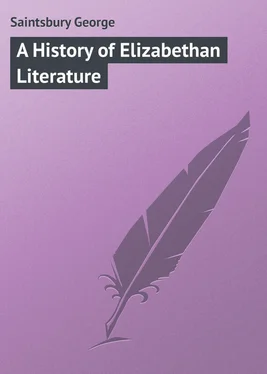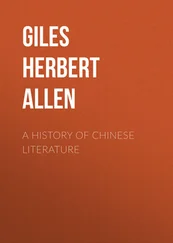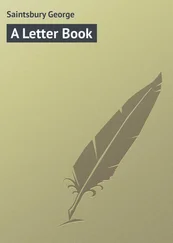George Saintsbury - A History of Elizabethan Literature
Здесь есть возможность читать онлайн «George Saintsbury - A History of Elizabethan Literature» — ознакомительный отрывок электронной книги совершенно бесплатно, а после прочтения отрывка купить полную версию. В некоторых случаях можно слушать аудио, скачать через торрент в формате fb2 и присутствует краткое содержание. Жанр: foreign_prose, на английском языке. Описание произведения, (предисловие) а так же отзывы посетителей доступны на портале библиотеки ЛибКат.
- Название:A History of Elizabethan Literature
- Автор:
- Жанр:
- Год:неизвестен
- ISBN:нет данных
- Рейтинг книги:5 / 5. Голосов: 1
-
Избранное:Добавить в избранное
- Отзывы:
-
Ваша оценка:
- 100
- 1
- 2
- 3
- 4
- 5
A History of Elizabethan Literature: краткое содержание, описание и аннотация
Предлагаем к чтению аннотацию, описание, краткое содержание или предисловие (зависит от того, что написал сам автор книги «A History of Elizabethan Literature»). Если вы не нашли необходимую информацию о книге — напишите в комментариях, мы постараемся отыскать её.
A History of Elizabethan Literature — читать онлайн ознакомительный отрывок
Ниже представлен текст книги, разбитый по страницам. Система сохранения места последней прочитанной страницы, позволяет с удобством читать онлайн бесплатно книгу «A History of Elizabethan Literature», без необходимости каждый раз заново искать на чём Вы остановились. Поставьте закладку, и сможете в любой момент перейти на страницу, на которой закончили чтение.
Интервал:
Закладка:
and the wonderful opening of Sonnet XXVII., "The star of my mishap imposed this pain."
The sixty-three sonnets, varied in different editions of Drayton's Idea , are among the most puzzling of the whole group. Their average value is not of the very highest. Yet there are here and there the strangest suggestions of Drayton's countryman, Shakespere, and there is one sonnet, No. 61, beginning, "Since there's no help, come let us kiss and part," which I have found it most difficult to believe to be Drayton's, and which is Shakespere all over. That Drayton was the author of Idea as a whole is certain, not merely from the local allusions, but from the resemblance to the more successful exercises of his clear, masculine, vigorous, fertile, but occasionally rather unpoetical style. The sonnet just referred to is itself one of the very finest existing – perhaps one of the ten or twelve best sonnets in the world, and it may be worth while to give it with another in contrast: —
"Our flood's Queen, Thames, for ships and swans is crowned;
And stately Severn for her shore is praised.
The crystal Trent for fords and fish renowned;
And Avon's fame to Albion's cliffs is raised;
Carlegion Chester vaunts her holy Dee;
York many wonders of her Ouse can tell.
The Peak her Dove, whose banks so fertile be;
And Kent will say her Medway doth excel.
Cotswold commends her Isis to the Tame;
Our northern borders boast of Tweed's fair flood
Our western parts extol their Wily's fame;
And the old Lea brags of the Danish blood.
Arden's sweet Ankor, let thy glory be
That fair Idea only lives by thee!"
"Since there's no help, come, let us kiss and part!
Nay, I have done. You get no more of me
And I am glad, yea, glad with all my heart
Конец ознакомительного фрагмента.
Текст предоставлен ООО «ЛитРес».
Прочитайте эту книгу целиком, купив полную легальную версию на ЛитРес.
Безопасно оплатить книгу можно банковской картой Visa, MasterCard, Maestro, со счета мобильного телефона, с платежного терминала, в салоне МТС или Связной, через PayPal, WebMoney, Яндекс.Деньги, QIWI Кошелек, бонусными картами или другим удобным Вам способом.
1
In original "tencrease," and below "timbrace." This substitution of elision for slur or hiatus (found in Chaucerian MSS.) passed later into the t' and th' of the seventeenth and eighteenth centuries.
2
As printed exactly in both first and second editions this sonnet is evidently corrupt, and the variations between the two are additional evidence of this. I have ventured to change "hid" to "hides" in line 10, and to alter the punctuation in line 13. If the reader takes "that" in line 5 as = "so that," "that" in line 10 as = "which" ( i. e. "black"), and "that" in line 11 with "which," he will now, I think, find it intelligible. Line 13 is usually printed:
"In summer, sun: in winter's breath, a frost."
Now no one would compare a black silk hood to the sun, and a reference to line 2 will show the real meaning. The hood is a frost which lasts through summer and winter alike.
3
In reading these combinations it must be remembered that there is always a strong cæsura in the midst of the first and Alexandrine line. It is the Alexandrine which Mr. Browning has imitated in Fifine , not that of Drayton, or of the various practitioners of the Spenserian stanza from Spenser himself downwards.
4
In these extracts () signifies that something found in text seems better away; [] that something wanting in text has been conjecturally supplied.
5
Thickets.
6
This Alexandrine is not common, and is probably a mere oversight.
7
The precedent descriptions of Sorrow herself, of Misery, and of Old Age, are even finer than the above, which, however, I have preferred for three reasons. First, it has been less often quoted; secondly, its subject is a kind of commonplace, and, therefore, shows the poet's strength of handling; thirdly, because of the singular and characteristic majesty of the opening lines.
8
Refusal.
9
Short for "whether."
10
This and the next extract are given literatim to show Stanyhurst's marvellous spelling.
11
The letter is given in full by Mr. Arber in his introduction to Ascham's Schoolmaster , p. 5.
12
It will be seen that Cheke writes what he argues for, "clean and pure English." "Other excellent" is perhaps the only doubtful phrase in the extract or in the letter.
13
The final s of such names often at the time appears unaltered.
14
i. e. "in proportion."
15
"Blinde" with the e according to the old spelling having six letters, the same number as seeing. This curious epistle is both in style and matter an epitome of Euphues , which had appeared some three years before.
16
Apparently = the book's.
17
"Assays."
18
Adulteress.
19
Understand "me."
20
Cf. Milton's "elms star-proof" in the Arcades . Milton evidently knew Peele well.
21
The outburst of Greene about "the only Shakescene," the "upstart crow beautified with our feathers," and so forth, is too well known to need extracting here. The Return from Parnassus , a very curious tripartite play, performed 1597-1601 but retrospective in tone, is devoted to the troubles of poor scholars in getting a livelihood, and incidentally gives much matter on the authors of the time from Shakespere downward, and on the jealousy of professional actors felt by scholars, and vice versâ .
22
Of Spenser as of two other poets in this volume, Shakespere and Milton, it seemed to be unnecessary and even impertinent to give any extracts. Their works are, or ought to be, in all hands; and even if it were not so, no space at my command could give sample of their infinite varieties.
23
Delia had appeared earlier in 1592, and partially in 1591; but the text of 1594 is the definitive one. Several of these dates are doubtful or disputed.
24
He is a little liable to be confounded with two writers (brothers of a patronymic the same as his title) Samuel and Christopher Brooke, the latter of whom wrote poems of some merit, which Dr. Grosart has edited.
25
Printed in England's Helicon "sleight."
Интервал:
Закладка:
Похожие книги на «A History of Elizabethan Literature»
Представляем Вашему вниманию похожие книги на «A History of Elizabethan Literature» списком для выбора. Мы отобрали схожую по названию и смыслу литературу в надежде предоставить читателям больше вариантов отыскать новые, интересные, ещё непрочитанные произведения.
Обсуждение, отзывы о книге «A History of Elizabethan Literature» и просто собственные мнения читателей. Оставьте ваши комментарии, напишите, что Вы думаете о произведении, его смысле или главных героях. Укажите что конкретно понравилось, а что нет, и почему Вы так считаете.












